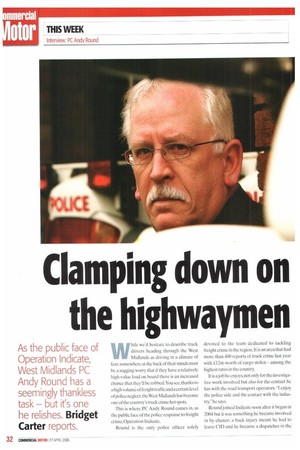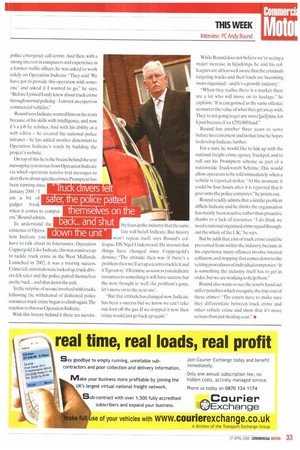Clamping down on the highwaymen
Page 32

Page 33

If you've noticed an error in this article please click here to report it so we can fix it.
While we'd hesitate to describe truck drivers heading through the West Midlands as driving in a climate of fear. somewhere at the back of their minds must be a nagging worry that if they have a relatively high-value load on board there is an increased chance that they'll be robbed.You see, thanks to a high volume of freight traffic and a certain level of police neglect, theWest Midlands has become one of the country's truck crime hot spots This is where PC Andy Round comes in, as the public face of the police response to freight crime. Operation Indicate.
Round is the only police officer solely devoted to the team dedicated to tackling freight crime in the region. It is an area that had more than 400 reports of truck crime last year with £12m-worth of cargo stolen — among the highest rates in the country.
It is a job he enjoys, not only for the investigative work involved but also for the contact he has with the road transport operators. enjoy the police side and the contact with the industry," he says.
Round joined Indicate soon after it began in 2004 but. it was something he became involved in by chance: a back injury meant he had to leave CID and he became a dispatcher in the police emergency call centre. And then, with a strong interest in computers and experience as a former traffic officer, he was asked to work solely on Operation Indicate. "They said We have got to provide this operation with someone' and asked if I wanted to go," he says. "Before I joined I only knew about truck crime through normal policing— I am not an expert on commercial vehicles."
Round says Indicate wanted him on the team because of his skills with intelligence, and now it's a job he relishes. And with his ability as a web editor — he created the national police intranet — he has added another dimension to Operation Indicate's reach by building the project's website.
On top of this he is the brains behind the text messaging system run from Operation Indicate via which operators receive text messages to alert them about specific crimes.Promptext has been running since January 2005."I am a bit of gadget freak when it conies to computers," Round admits.
Truc Elvers sa er, t e po ice t emse
To understand the existence of Operation Indicate you have to talk about its forerunner. Operation Coppergold. Like Indicate, this was a unit set up to tackle truck crime in the West Midlands. Launched in 2002, it was a roaring success. Crime fell.criminals were locked up,truck drivers felt safer and the police patted themselves on the hack... and shut down the unit.
To the surprise of no one involved with trucks, following the withdrawal of dedicated police resources truck crime began to climb again.The reaction to this was Operation Indicate.
With this history behind it there are inevita bly fears in the industry that the same fate will befall Indicate. But history won't repeat itself, says Round's colleague, DS Nigel Underwood. He stresses that things have changed since Coppergold's demise: "The attitude then was 'if there's a problem then we'll set up a team to tackle it and it'll go away'. Of course, assoon as you dedicate resources to something it will have success, but the next thought is 'well, the problem's gone. let's move on to the next one'.
"But that attitude has changed now. Indicate has been a success but we know we can't take our foot off the gas. If we stopped it now then crime would just go back up again." While Round does not believe we're seeing a major increase in hijackings, he and his colleagues are all too well aware that the criminals targeting trucks and their loads are becoming more organised— and it's a growth 'industry'.
"When they realise there is a market there are a lot who will move on to haulage." he explains. "It is categorised as the same offence, no matter the value of what they get away with. They're not going to get any more [jail] time for it just because it's a £250,000 load."
Round has another three years to serve before his retirement and in that time he hopes to develop Indicate further.
For a start, he would like to link up with the national freight crime agency,Truckpol, and to roll out his Promptext scheme as part of a nationwide Truckwatch Scheme. 'Ibis would allow operators to be told immediately when a vehicle is reported stolen. "At the moment, it could be four hours after it is reported that it goes onto the police computer," he points out.
Round readily admits that a similar problem afflicts Indicate and he thinks the organisation has mainly been reactive rather than proactive thanks to a lack of resources. "I do think we need a national organised crime squad throughout the whole of the UK," he says.
But he adds that a lot of truck crime could be prevented from within the industt-y, because in his experience many offences involve internal collusion,and stopping that comes down to the vetting procedures of individual companies:"It is something the industry itself has to get in order, hut we are working to help them."
Round also wants to see the courts hand out stiffer penalties which recognise the true cost of these crimes: "The courts have to make sure they differentiate between truck crime and other vehicle crime and show that it's more serious than just stealing a car." •




































































































































































































